AZTERLAN
Knowledge Hub
Find out the technological developments, inventions, new materials and dissemination activities developed by the AZTERLAN team.
What are you looking for?
Developments and capabilities:
Dissemination:

Revisiting Thermal Analysis of Hypereutectic Spheroidal Graphite Cast Irons
This study deals with early solidification of hypereutectic cast irons at varying carbon content and roughly constant alloying additions. Thermal
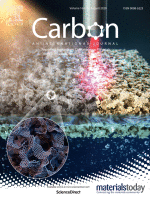
Hopper-skeletal and hemispherical crystallization of graphite in iron–carbon–silicon alloys
The growth of graphite during solidification and solid-state transformation of Fe–C–Si alloys continues to be the subject of extensive research.

Influence of graphite morphology on electrochemical corrosion behaviour in cast irons
Cast irons are widely used in the automotive industry due to its excellent castability, fluidity, machinability and wear resistance. Industrial
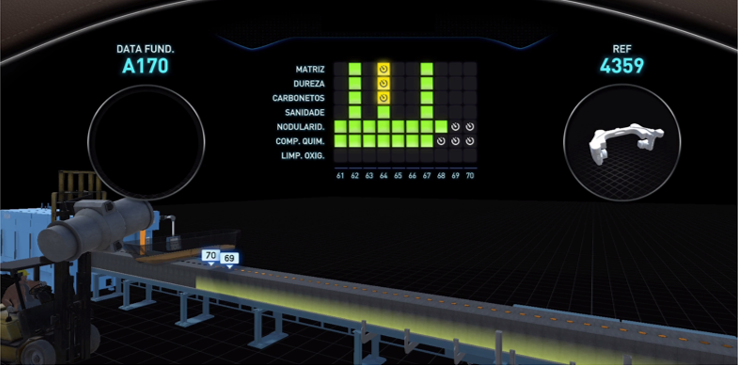
Mold by mold control
In the iron casting process, especially in the case of green sand moulds, the significant variability of the critical parameters

Comparison of solidification kinetics of compacted and lamellar cast irons
Thermal analysis is largely used in cast-iron foundry shops as a means to check melt preparation before casting. It has

Effect of the section size, holding temperature and time on the kinetics of the ausferritic transformation and mechanical properties of as-cast ausferritic ductile iron
The present research work studies the effect of section size, holding temperature and time on the microstructure and mechanical properties

Effects of cobalt on mechanical properties of high silicon ductile irons
High silicon ductile irons are being developed due to their advantages relating to pearlitic-ferritic grades (high ductility, fully ferritic structures,
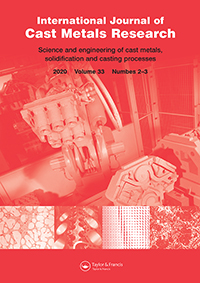
Surface modification of ductile iron produced by an innovative in-situ casting technique
In this study, a chromium carbide layer was fabricated by an in-situ casting technique on ductile iron cast components. The

90 years of thermal analysis as a control tool in the melting of cast iron
Since its first literature mention in conjunction with cast iron in 1931 by Esser and Lautenbusch, thermal analysis (TA) has

Modelling of compacted graphite cast iron solidification-Discussion of microstructure parameters
A melt maintained for hours in a press pour unit allowed the following changes over time from spheroidal graphite to

Effect of antimony on the nucleation process of spheroidal graphite iron
To further understand the influence of subversive elements on the nucleation process of spheroidal graphite, melts with antimony contents ranging
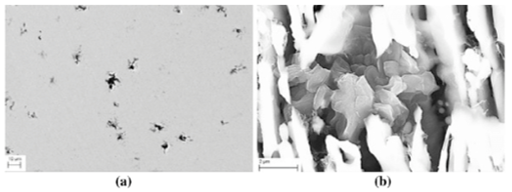
Reply to Comment on “Recent Developments in Understanding Nucleation and Crystallization of Spheroidal Graphite in Iron-Carbon-Silicon Alloys”
In their comments, Lacaze and Castro-Roman [1] seek to correct some statements that we made in our recent paper published
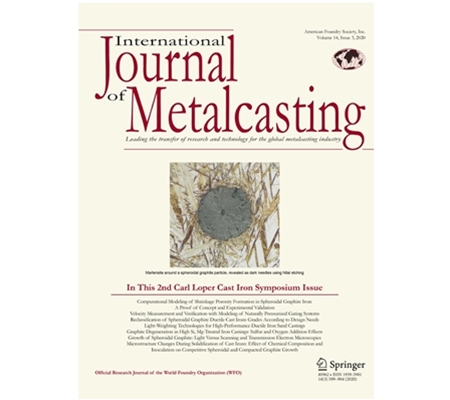
Graphite Nucleation in Compacted Graphite Cast Iron
During the last several decades, a multitude of theories have attempted to explain the process of graphite nucleation in lamellar

Recent Developments in Understanding Nucleation and Crystallization of Spheroidal Graphite in Iron-Carbon-Silicon Alloys
The last decade has witnessed significant research efforts directed to the understanding of nucleation and crystallization of graphite and associated

Quantitative analysis of the effect of inoculation and magnesium content on compacted graphite irons – Experimental approach
In many industrial domains, compact graphite cast irons are developing rapidly at the expense of lamellar graphite irons. The formation

Effect of Magnesium on the Solid-State Nucleation and Growth of Graphite During Annealing of White Iron
It is well-established that growth of spheroidal graphite occurs in several stages such as directly in the liquid, in the

